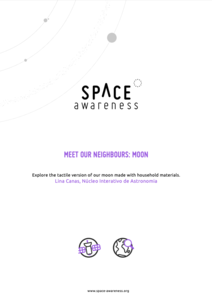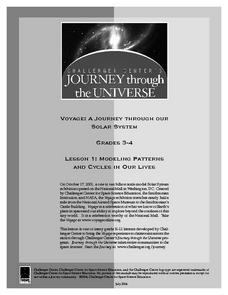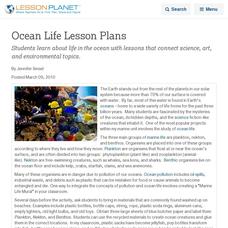International Technology Education Association
Pixel This!
Did the image I drew match the image you saw? By simulating a satellite and a ground station, teams of two transmit data in the form of pixels in order to recreate an image. They use four different levels of brightness, creating slightly...
Curated OER
Melting the Ice: Energy Transfer
Students study thermal energy and energy transfer to sea ice processes. In this energy transfer lesson, students make their own ice cream and discuss energy transfer and thermal energy. Students view a radiation overhead and its role in...
Space Awareness
Meet Our Neighbors: Moon
Since a field trip to the moon isn't possible, bring the moon to young astronomers! Participants use everyday materials to create models of the moon and represent the features on its surface. The materials serve as a tactile as well as a...
Curated OER
Sky Observations Sky & Cloud Windows
Students observe the sky and weather to gather data. They conduct experiments to answer questions about the sky and weather phenomena. They measure, analyze and present data. They create sky windows by gluing sky colored paint chips...
Curated OER
Modeling Patterns and Cycles in Our Lives
Students explore how building a model can help them better understand the natural world. They identify common cycles or patterns in nature as well as examples of models in the classroom. After discussion, they choose a pattern or cycle...
Curated OER
Fact or Fantasy?
Are we alone in the universe? This brief informational text on extraterrestrial theory has been split into seven sections to help scholars practice note taking. They read the statements, underlining key words. Then, using the graphic...
Messenger Education
Give Me a Boost—How Gravity Assists Aid Space Exploration
The propellant needed for space explorations runs in the thousands, while paying to get the craft into orbit costs millions! In the second installment of three, two activities explore laws of conservation of energy and momentum. Using...
Curated OER
SIZING UP SOL
Ninth graders produce a projected, pinhole image of the sun and from measurement of the image and projection distance, calculate the actual size of the sun. They estimate the sun's apparent brightness from different planet.
Starry Night Education
Comets and Meteors
Comets are also known as dirty snowballs or icy mud balls. With your super scientists, create a model comet nucleus to discover how they are made and take part in a scientific discussion to learn how it behaves.
Glynn County School System
Light, History, Gravity, Distance, Relativity, and Space-Time
Let the star's color be the guide! The color of a star indicates its temperature and its mass and distance affect the gravitational force. The lesson presentations address these concepts as well as how the theory of special relativity...
Curated OER
Mars Calendar Project
Students design a calendar that displays time on Mars. They explore the differences between time on Earth and time on Mars while making the calendar.
Curated OER
A Cosmic Cafeteria
Students indentify and differentiate between transit and surface food systems. Students measure energy that is released by various foods. Students compare and contrast cooking with solar energy on earth and what they might have learned...
Curated OER
How Far Away is SOHO?
Students create a scale model of the Earth and the sun that demonstrates where the SOHO satellite is in relation to the Earth.
Curated OER
Satellite Mobiles
Students discuss satellites and their functions. They design and construct their own satellite out of readily available materials. Students are taught the definition of a satellite. They discuss the two main purposes of satellites:...
Curated OER
Plotting Sunspot Activity
Students explore how to graph sunspots using a solar graph. In this sunspots instructional activity students investigate sunspots and complete and evaluation worksheet.
Curated OER
Name that Wind
Students study wind and the direction terms related to wind. In this meteorology lesson, students learn about the wind directions by completing a wind direction activity where kids locate cones marked with the specific wind directions....
Curated OER
Sea to Sky
Students investigate the Earth's major landforms and how they occur, and how engineers apply this knowledge for the design of transportation systems, mining, and measuring natural hazards. They listen to a teacher-led lecture, match...
Curated OER
Cosmic Collision
In this cosmic collision worksheet, students explore interactive online website to study about the dynamics of different galaxies. They write short answers to 8 questions that follow.
Curated OER
Ocean Life Lesson Plans
Students learn about life in the ocean with lessons that connect science, art, and environmental topics.
Curated OER
Mission Planning: Earth/Mars Comparisons
Students compare and contrast conditions on Mars to those on our own planet, specifically, their local or regional environments. The physical characteristics, the atmosphere, and other astronomical data is considered.
Curated OER
Origins: Earth is Born
Students collect and identify micrometeorites from space. Students create collection devices and retrieval methods for matter. They prepare slides and view particles found. Students discuss where the identifiable particles originated...
Curated OER
Asteroids
Learners examine the different types of asteroids and how they enter the atmosphere. In this space lesson students use mashed potatoes to create an asteroid they can eat.
Curated OER
TE Activity: Space Shelter
Students simulate that they need to develop a new home on a different planet. They design a shelter that will ensure their survival after researching the characteristics of the other planet. They write an essay about their home design.
Curated OER
Space Exploration Missions
Eighth graders explore and discuss the various space exploration missions. In this space mission lesson students work in pairs and create a PowerPoint presentation on the contributions of space exploration missions.

























